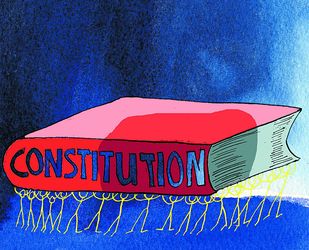How many times have the policies of the Narendra Modi government been called unconstitutional? We have lost count.
Never in the history of our 75 years of Independence did the right policies make way into execution. The money remained in the hands of a few elite people and the common man suffered. Not providing, or even talking about, basic facilities—like cleanliness, toilets, roads, water, irrigation facilities, crop insurance and electricity—was a norm. The poor believed that they are destined to remain deprived and fight for basic rights all their lives. It surprises me how this was never considered unconstitutional. The Modi government has executed the basic principles of the Constitution into our daily lives. This should have been done many decades ago.
Constitution is not a dead letter. It is the soul of our country, and the soul of this Constitution is inclusion, freedom to contribute towards our society and the nation, and freedom to participate in constructive nationalism.
The Modi government has worked on the guiding principles of the Constitution. It has provided affordable housing for all, brought in sanitary toilets through the Swachh Bharat Abhiyan, introduced the Pradhan Mantri Garib Kalyan Anna Yojana, where free foodgrain was distributed to the poor. The list is a long one. In the true sense, the Constitution is the religion of our country and the Modi government has worked to follow that religion. Having said that, there were two things that remained incomplete in our Constitution. The government completed them.
1) The abrogation of Article 370 to end the special status of Jammu and Kashmir.
2) The National Education Policy 2020 has recognised all Indian languages as national languages and included them in the school curriculum. The words of the Constitution have been given vibrancy by my government.
The Modi government also introduced the provision of celebrating the first Constitution Day (November 26), for Constitution is not only for the understanding of a few elite people, the legal profession, and the courts, but also for the people, of the people, and by the people. The Constitution, at its core, supports democracy, secularism, social justice and individual liberty. The Modi government has launched several schemes which are right in line with these principles.
The emphasis on economic growth and poverty alleviation in schemes like Pradhan Mantri Jan Dhan Yojana, Pradhan Mantri Ujjwala Yojana, and Ayushman Bharat are an attempt to fulfil the constitutional directive of ensuring social security and economic justice for all citizens.
The Modi government’s focus on infrastructure development, as evidenced by initiatives such as the Swachh Bharat Abhiyan, the Smart Cities Mission, Har Ghar Jal and the Pradhan Mantri Awas Yojana, is in line with the constitutional mandate to ensure a decent standard of living for all. These plans strive to create more sustainable and inclusive urban and rural environments, while addressing socio-economic inequalities as outlined in the Constitution.
The principle of federalism is at the heart of the Constitution, and the Modi government’s approach to cooperative federalism is reflected in schemes such as the GST and The Government of National Capital Territory of Delhi (Amendment) Bill, 2023. These initiatives aim to promote economic unity among the states and strengthen India’s self-reliance, echoing the constitutional vision of a cooperative and cohesive federal structure.
Far from being unconstitutional, the Modi government is the most constitutionally aligned government India has ever had.
Lekhi is Union minister of state for external affairs and culture.


